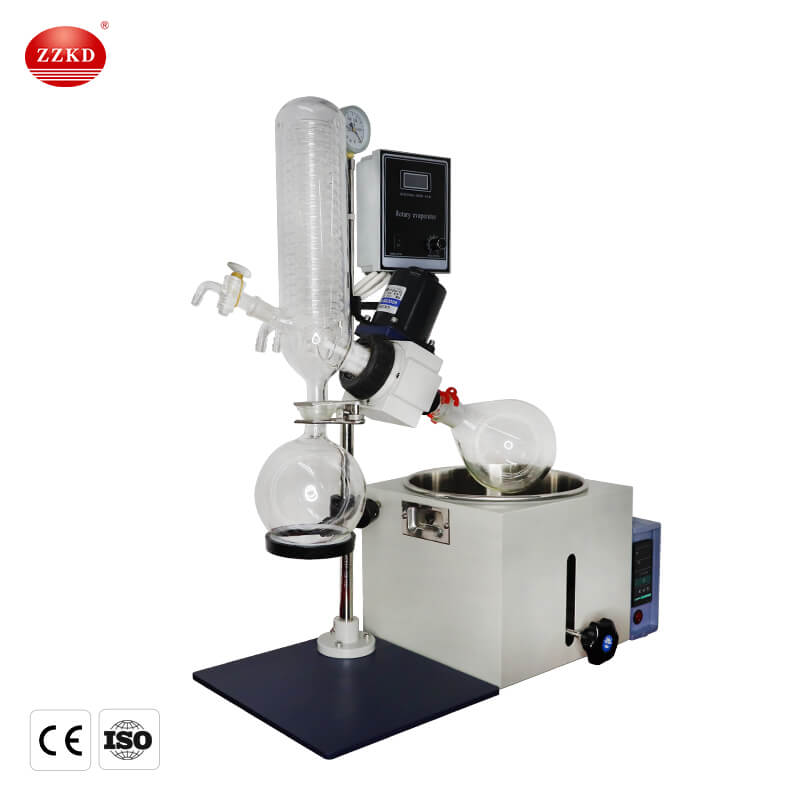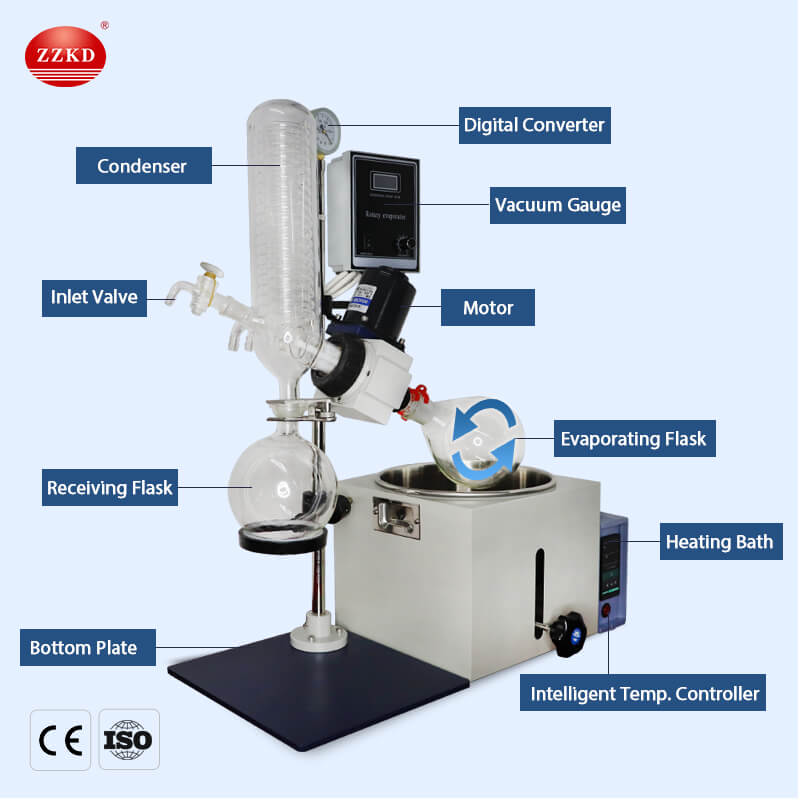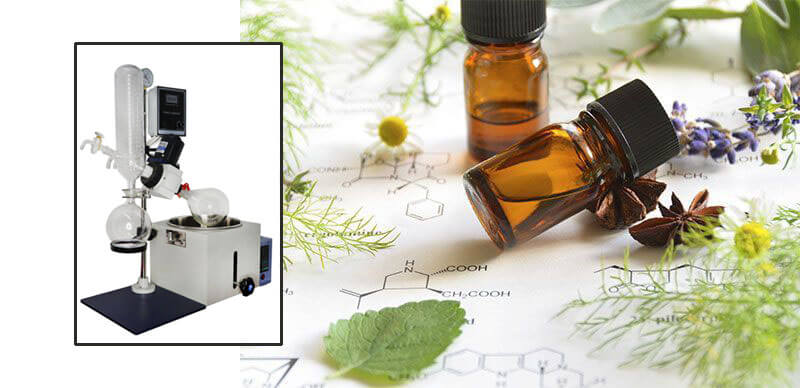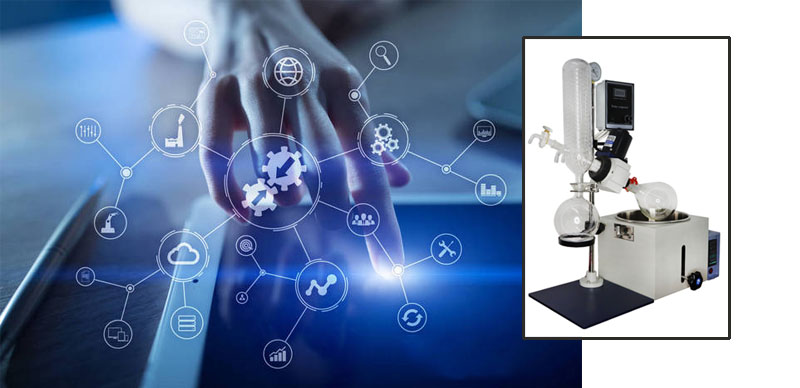Micro rotary evaporators are innovative laboratory instruments that have transformed the field of chemical analysis and distillation. With their compact design and precise functionality, these devices enable scientists to perform efficient and reliable solvent evaporation, concentration, and purification processes. In this article, we will delve into the working principles of micro rotary evaporator, explore their numerous advantages, discuss a practical application case, and contemplate the future developments in this cutting-edge technology.
Introduction to Micro Rotary Evaporators
Micro rotary evaporators, also known as mini rotary evaporators or mini-rotavaps, are compact and versatile laboratory instruments used for solvent removal and concentration. These instruments are based on the principle of evaporation and employ a rotating flask, a heating bath, and a condenser to facilitate the separation of solvents from samples.

Working Principles and Components
Micro rotary evaporators consist of several key components, each playing a vital role in the evaporation process. The primary components include:
1. Rotating Flask: This glass vessel holds the sample to be evaporated and is connected to the vacuum system and condenser. The flask is placed on a rotating mechanism, enabling even heating and efficient evaporation.
2. Heating Bath: The heating bath, usually made of stainless steel or aluminum, provides a controlled and uniform heat source to the rotating flask. This ensures that the sample is heated evenly, facilitating efficient evaporation.
3. Condenser: The condenser is responsible for converting the evaporated solvent vapor back into liquid form. It consists of a coiled glass tube or a combination of glass and metal, allowing efficient cooling of the vapor. The condensed liquid is collected separately for further analysis or disposal.
4. Vacuum System: A vacuum pump or aspirator is employed to create a reduced pressure within the system. This lowers the boiling point of the solvent, facilitating its evaporation at lower temperatures.

Key Advantages and Applications
Micro rotary evaporators offer several advantages over traditional distillation methods, making them invaluable tools in various scientific and industrial applications. Some of the key advantages include:
1. Efficient and Rapid Evaporation: Micro rotary evaporator provide rapid and efficient solvent evaporation due to their high surface area-to-volume ratio. The rotating flask and vacuum system enable faster evaporation rates, reducing the time required for sample preparation.
2. Precise Temperature Control: These devices offer accurate temperature control, allowing researchers to perform distillation processes at specific temperatures, minimizing the risk of sample degradation or loss of volatile compounds.
3. Compact Design: Micro rotary evaporators are designed to occupy minimal laboratory space. Their compact size makes them ideal for small-scale applications, such as research laboratories or pilot-scale production.
4. Versatile Applications: These instruments find applications in a wide range of scientific fields, including pharmaceuticals, chemistry, food and beverage, fragrance and essential oil extraction, and environmental analysis. They are particularly useful for concentrating and purifying samples, separating solvents, and extracting volatile compounds.

Application : Extracting Essential Oils from Botanicals
To illustrate the practical application of micro rotary evaporators, let’s consider the extraction of essential oils from botanicals. Essential oils are concentrated plant extracts used in various industries, including aromatherapy, perfumery, and natural product development.
The process of extracting essential oils involves steam distillation or solvent extraction. Micro rotary evaporators offer a valuable alternative for solvent extraction, enabling efficient and precise concentration of essential oils. By utilizing a suitable solvent, the micro rotary evaporator can separate the oil from the plant material, leaving behind a concentrated extract.

Future Developments and Conclusion
As technology continues to advance, we can expect further developments and enhancements in micro rotary evaporators. Some potential areas of improvement include:
1. Automation and Integration: Integration with automation systems and advanced control algorithms can enhance the efficiency and ease of operation of micro rotary evaporators. This would allow for more precise control over parameters such as temperature, rotation speed, and vacuum levels.
2. Enhanced Safety Features: Future micro rotary evaporators may incorporate improved safety features such as automated shutdown mechanisms, advanced pressure sensors, and real-time monitoring capabilities. These additions will ensure the safe operation of the instrument and protect both the user and the samples.

Micro rotary evaporators have revolutionized the field of chemical analysis and distillation, offering compactness, efficiency, and precise control. Their numerous advantages, including rapid evaporation, precise temperature control, and versatile applications, make them indispensable tools in various scientific disciplines. As technology progresses, we can look forward to further advancements in this field, enabling researchers to push the boundaries of scientific exploration and innovation.
